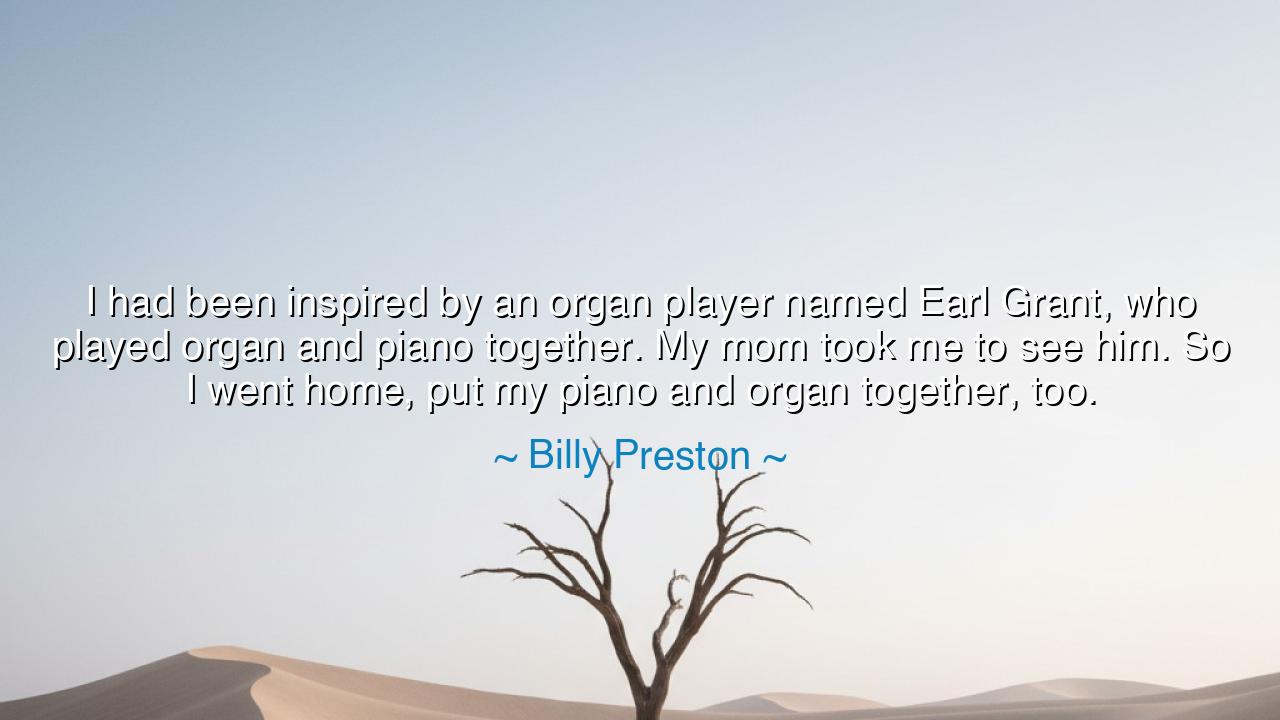
I had been inspired by an organ player named Earl Grant, who
I had been inspired by an organ player named Earl Grant, who played organ and piano together. My mom took me to see him. So I went home, put my piano and organ together, too.






In the luminous words of Billy Preston, the man often called the Fifth Beatle, there rings a truth as old as creation itself: “I had been inspired by an organ player named Earl Grant, who played organ and piano together. My mom took me to see him. So I went home, put my piano and organ together, too.” These are not merely the recollections of a musician; they are the sacred testimony of inspiration, that divine spark that leaps from one soul to another, igniting the fires of creativity across generations. For what Preston describes is the eternal cycle by which art begets art, and greatness is born not from isolation, but from admiration.
The ancients would have understood this deeply. They spoke often of the muse, the unseen spirit who whispers to the heart of the artist, calling forth beauty from silence. Yet what Billy Preston reveals is that the muse sometimes wears a mortal face — that Earl Grant, through his art, became that divine messenger. In watching Grant weave melody upon melody, Preston felt not envy, but awakening. His soul recognized its kin, and in that moment, the young musician’s destiny shifted. This is how inspiration truly works: it does not tell you what to do, it reminds you of what you already are.
And behold the wisdom of Preston’s mother, whose simple act — taking her child to hear greatness — set the course of his life. How often do such quiet gestures shape the fate of the world! Behind every artist, warrior, or thinker stands one who first opened a door. Like a priestess guiding a pilgrim to the temple, Preston’s mother led him to the altar of sound, where his heart caught fire. In honoring her, we honor all those unseen mentors who, with patience and love, fan the small flame within another until it becomes a roaring light.
Preston’s act of going home to combine his piano and organ was no small thing. It was a moment of creation — the child mirroring the divine. For when a human being takes what they have seen and transforms it into something new, they partake in the sacred act of innovation, which is the heartbeat of progress. The boy did not merely copy what he admired; he reimagined it. He took inspiration and turned it into action, and thus began the alchemy of mastery. From that moment onward, Billy Preston’s music would carry not only his own soul but the echo of Earl Grant’s — and through it, the chain of inspiration would continue.
Consider the story of Michelangelo, who once gazed upon a block of marble and saw within it an angel waiting to be freed. Yet it was not genius alone that guided his hand, but the works of Donatello and Ghiberti before him — men whose art stirred his spirit as Grant stirred Preston’s. Michelangelo did not imitate; he transcended. The masters before him were not rivals but bridges, leading him to his own greatness. So it is with every generation of creators, thinkers, and dreamers. Each flame is lit by another, and in turn, must light the next.
In these words, Billy Preston teaches a truth both humble and mighty: that the seed of greatness often lies dormant until the right example awakens it. To see another’s brilliance is not to be diminished, but to be invited. When we witness excellence — in art, in courage, in kindness — we are being called to rise. The world progresses not by the proud isolation of genius, but by the sacred exchange of inspiration, passed from one heart to another like fire along a torchline through the ages.
And so, the lesson for all who hear this tale is clear: seek out what inspires you, and then act upon it. Do not merely admire the beauty of others — build upon it. When you encounter greatness, let it move you to create, not to compare. Parents, teachers, and friends — be the ones who open those doors for others. Take your children to see what stirs the soul. Let no spark of curiosity go unfed. For within that spark may dwell the song that will one day change the world.
Thus, through the simple memory of a musician and his mother, we are reminded of a timeless truth: inspiration is the divine conversation between souls, where one heart’s music awakens another’s dream. And when we, like young Billy Preston, dare to bring together the instruments of our own gifts — when we unite the piano and the organ of our talents — we, too, become creators of light, continuing the eternal symphony that began long before us and will echo long after we are gone.






AAdministratorAdministrator
Welcome, honored guests. Please leave a comment, we will respond soon